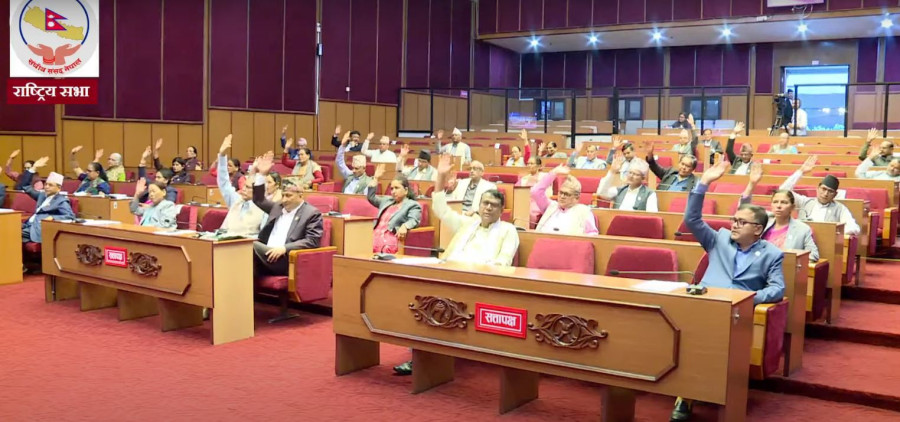National
National Assembly endorses bill to criminalise usury
The new law will come into immediate effect once it receives the presidential seal.
Post Report
The National Assembly on Thursday endorsed the bill criminalising usury, paving the way for its authentication.
The upper house unanimously endorsed the ‘bill to amend some Nepal Acts’ that the Minister for Law, Justice and Parliamentary Affairs Dhan Raj Gurung had tabled at its meeting on Thursday.
The bill was put to a vote after none of the lawmakers took part in a discussion on the bill.
There was a delay in forwarding the bill to the President for authentication after National Assembly chair Ganesh Prasad Timilsina refused to include the bill in the business, arguing that the lower house didn’t follow due process while sending it to the upper house.
After Timilsina held some rounds of consultations with experts and other authorities, the upper house re-endorsed the bill accepting the amendment to the bill criminalising usury sent by the House of Representatives with amendment and message.
The government on May 3 had introduced an ordinance to amend the prevailing criminal code and define the practice of usury as a criminal offence. The ordinance later expired as Parliament did not adopt it within 60 days of the House session’s commencement.
On June 20, the government tabled a replacement bill at the upper house, which endorsed it on June 30. The bill was then tabled at the House of Representatives two days later.
The replacement bill to the ordinance must have been endorsed by Parliament by July 5. But the opposition parties obstructed the House proceeding that day, protesting against a controversial statement made by Prime Minister Pushpa Kamal Dahal at a book launch event. The replacement bill thus couldn't be endorsed at the meeting.
Later, on July 16, the House of Representatives unanimously endorsed the replacement bill and sent it to the National Assembly, where it originated.
Although 14 cross-party lawmakers had registered several amendments to the bill that revises the civil code, they withdrew their proposals after minister Gurung agreed to incorporate some of their concerns in the bill.
As both the federal houses have endorsed the bill, now it will come into force once it receives the presidential seal. The bill criminalises the practice of lending money for interest through unfair transactions.
The bill terms forcible transfer of the debtor’s immovable property through the use of any kind of threat or violence or exploitation for the purpose of debt recovery as an unfair transaction.
Charging exorbitant interest to the extent that the interest exceeds the principal amount is punishable as per the bill. It has a provision that individuals who conduct transactions against the rules can face imprisonment for up to seven years and a fine of up to Rs70,000.
Other punishable offences involve not providing receipts for the amounts paid by the borrowers, threatening and exploiting borrowers, and unlawfully seizing their properties.




 10.28°C Kathmandu
10.28°C Kathmandu













